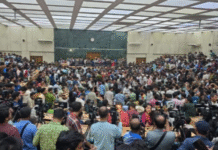
The Directorate General of Forces Intelligence (DGFI) destroyed evidence of enforced disappearance from the Joint Interrogation Cell, commonly referred to as Aynaghar, even after the ouster of the Awami League-led government on 5 August, the Commission for Inquiry on Enforced Disappearance has found.
The agency made “partial structural alterations of the JIC (Joint Interrogation Cell) at DGFI headquarters, including painting over the walls where prisoners testified that they had carved out their details” in the post-5 August period, the commission’s report, submitted to the chief adviser today (20 January), reads.
“The then Director General of DGFI assumed his role several days after 5 August 2024. And yet, at least some of this evidence manipulation was carried out as recently as the day before our visit—while the centre was under his command and despite being informed of our inspection—because we found the paint wet at the time of our visit.
At the time of the commission’s visit, Maj Gen Muhammad Faizur Rahman was the director general of the DGFI. He was made the DG on 11 August 2024, replacing the AL-era DGFI chief Maj Gen Hamidul Haque. Faizur was replaced on 17 October.
“The wet paint and incomplete structural modifications clearly indicated a hurried attempt to conceal crimes,” adds the report.
Stating that the then DG persuasively argued that he was not directly involved in crimes committed before his tenure, his immediate response to “manipulate evidence underscores the coercive power of this culture of impunity”, according to the commission.
“His actions, ostensibly to shield perpetrators of past crimes, went against his own self-interest and professional integrity,” it adds.
“Pattern of doctoring of evidence not isolated to DGFI only”
The inquiry commission states that apart from the DGFI, other security forces were also involved in tampering with evidence related to enforced disappearance.
“This pattern of doctoring of evidence and non-cooperation was not isolated to DGFI only. Across various security forces, evidence of crimes spanning over 15 years has been systematically manipulated,” states the report.
“It was done not only by those in power till 5 August 2024, some of whom likely sought to cover up their own crimes, but also by those who assumed leadership afterwards,” it adds.
The evidence tampering reveals the pervasive and coercive nature of the culture of impunity, which compels even those not originally directly involved in the commission of offences to protect and perpetuate it.
“Additionally, the victims who managed to survive enforced disappearances have provided testimony about the conflicting behaviour of their captors. Whilst many prison guards shared the cruelty of their high-ups, a minority of prison guards were reportedly kind – sharing food, and information, and expressing empathy by acknowledging the innocence of the detainees. To the prisoners, they excused their inability to confront the injustice they personally oversaw by pleading that they were “hukumer golam” (or slaves to their command),” says the report.
Citing a victim’s testimony to provide a “striking example of this moral conflict”, the commission says as the victim “was being handed over to DGFI officials, a DB officer accompanying him in the car had tears in his eyes and begged forgiveness, clearly uncomfortable with the order that he was carrying out”.
“An even starker example comes from another victim, a supporter of Jamaat-e-Islami, who recounted how a police officer, whilst throwing him to his planned death in front of an oncoming vehicle, apologised for doing so, pleading, ‘Please forgive me. I have no choice,'” the commission states further depicting the moral conflict.
“It was only due to the vehicle failing to hit him at the last minute, possibly due to swerving, and the officer’s unwillingness to repeat the murderous attempt that the victim survived,” the report adds.
This officer’s act of attempted murder, evidently contrary to his personal beliefs, highlights the extent to which the members of the security forces have been compelled into complicity in serious crimes, including capital offences, even when such actions are against their personal and professional interests, says the report.
tbs









